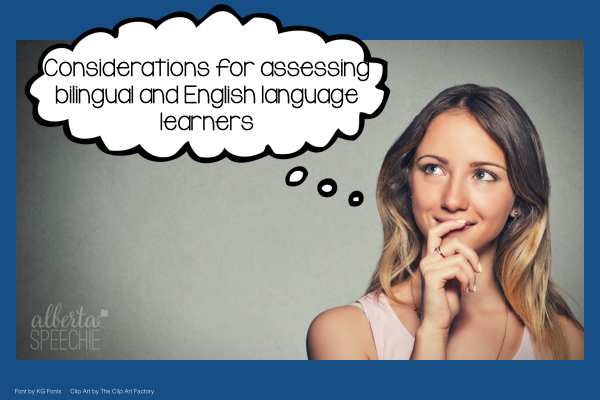So you have identified a child you are going to assesses as either bilingual or does not speak English at home. Now what do you do? If you’re like me, you don’t speak Korean, Urdu, Russian or the other dozens of languages the children you work with speak. Also, I don’t speak French or Spanish well enough to critically analyze their language skills (I wish I did). Well if you do speak Spanish or French, you’re in luck. Some of the language assessments have been translated and normed. But that is not the whole story. Here are some important factors to consider.
1. Assessment norms are based on monolingual English (or Spanish or French) speakers. They are not normed with children who are bilingual or are learning English. Scoring them can be misleading.
2. Bilingual children will have a language more dominant than another. It is the language (s)he is more exposed to at home and in the community. Their milestones (e.g. started combining words) should be very similar in that language to that of a monolingual speaker.
3. While doing an assessment, language specific questions (e.g. grammar development) are not appropriate (their language development profile is different), but assessing more general language can be appropriate (e.g. how do they use language).
4. For me, these assessments tend to be more of an interview with the parents (I work with preschoolers). I try to get as much information as possible. Often I will use some (or all) of the parent questionnaires such as the REEL-3 or Rossetti. I also ask the parents to tell me if a question does not apply to their language or is culturally inappropriate. I do not score these questionnaires but they do give lots of useful information. I will also spend time with the child playing to see how they interact with me.
For me, determining if a child who either doesn’t speak English or is bilingual is more complicated than that of a monolingual English speaker. Having said that, I found some wonderful resources that have helped me over the years. My favourite one (and the one that I used to double check my information) is Dual Language Development Disorders 2: A Handbook on Bilingualism and Second Language Learning Edited by Johanne Paradis, Fred Genesee and Martha B. Crago (Paul Brookes Publishing Company, 2011). I don’t have any financial stake in saying this is a great book and have gone back to it many times.
3. While doing an assessment, language specific questions (e.g. grammar development) are not appropriate (their language development profile is different), but assessing more general language can be appropriate (e.g. how do they use language).
4. For me, these assessments tend to be more of an interview with the parents (I work with preschoolers). I try to get as much information as possible. Often I will use some (or all) of the parent questionnaires such as the REEL-3 or Rossetti. I also ask the parents to tell me if a question does not apply to their language or is culturally inappropriate. I do not score these questionnaires but they do give lots of useful information. I will also spend time with the child playing to see how they interact with me.
For me, determining if a child who either doesn’t speak English or is bilingual is more complicated than that of a monolingual English speaker. Having said that, I found some wonderful resources that have helped me over the years. My favourite one (and the one that I used to double check my information) is Dual Language Development Disorders 2: A Handbook on Bilingualism and Second Language Learning Edited by Johanne Paradis, Fred Genesee and Martha B. Crago (Paul Brookes Publishing Company, 2011). I don’t have any financial stake in saying this is a great book and have gone back to it many times.


2 Comments
Hello! I am an ESL teacher and one of the most frequent questions I am asked is how do we determine if an ESL student has a Speech and Language delay. My answer (even though they don't like it) is that the delay would be present in the native language as well as the second language – since we don't have tests in the native language (most of my students speak Bosnian) this definitely means talking with the parents (usually with a translator). Thanks for writing about this from the point of view of a speech teacher!
Michelle
TeachingEternity.blogspot.com
You're welcome!